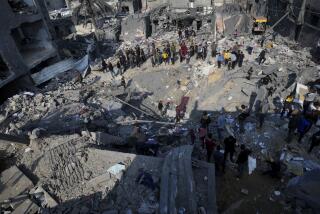Where’s the Strategy in the Iraq Policy?
- Share via
NEW YORK — When President Bill Clinton was asked at a recent press conference whether he lacked a strategy for dealing with Iraq, he replied: “Since 1991, our strategy has been to keep the sanctions on, keep Iraq from rebuilding its military might and threatening its neighbors . . . but our strategy depends in no small measure, I believe, on whether this agreement is honored.”
But a floundering inspection system is a tactic, not a strategy. Strategy must define what we are trying to accomplish and whether means are relevant to ends. The failure to develop a strategy has seen Saddam Hussein, crisis by crisis, transform the political situation in his favor.
U.S. policy in the Gulf starts with the dilemma that we are pursuing sanctions against the two strongest countries in the region, both hostile to us. But dual containment is under enormous pressure from all directions, including recalcitrant allies. If we are either to sustain or modify it from a position of strength, we need to be clear about what Hussein represents.
After all that has passed between Hussein and the United States, no deal is conceivable no matter what he does regarding inspection. If we cannot negotiate with Hussein, we must try to weaken or, if possible, to overthrow him. The outcome of any crisis with him must be viewed in terms of its impact on that objective.
The outcome of the most recent crisis fell far short. At the least we should have insisted on unconditional return to the established inspection procedures and some penalty for abandoning the U.N. inspection system for five months. The “face-saving” outcome represents a gain for the Iraqi dictator.
Hussein seems to have had four objectives: 1) to focus the world’s attention on Iraq’s grievances; 2) to force into the open the latent split between the permanent members of the Security Council, especially among the United States and France, Russia and to a lesser extent China; 3) to involve the security-general as a mediator, thus putting Hussein on the same level as his adversaries, and 4) to shift the focus of the debate from inspection to lifting the sanctions. Hussein is well on the way to achieving each objective.
In all probability, the next major challenge from Iraq will not be over inspection but over the lifting of sanctions. Hussein is likely to use meticulous behavior in the inspections as a wedge for demanding the end of sanctions. The U.N. secretary-general’s statements at the end of his Baghdad visit point in that direction. France, Russia and Italy have already endorsed such an approach.
Iraq’s sponsors in the United Nations have a good chance of obtaining the necessary Security Council majority. Our expected veto will advertise our growing isolation and probably lead other countries to relax their compliance with the sanctions. It would render even more precarious any attempt to obtain Security Council support for retaliatory action.
Hussein’s involvement of the U.N. secretary-general reinforces thus possibility. Kofi Annan’s obligation is to reflect the consensus of the Security Council as he understands it and, since there is no consensus, he is bound to urge compromise. While the U.S. national interest would have been served by ending the confrontation with either Hussein’s diplomatic humiliation or his significant weakening by military action, the secretary-general had no basis for pressing for such an outcome.
Before Annan went on his mission, it is reported that U.S. Secretary of State Madeleine K. Albright conveyed to him principles by which the existing system could be modified. The State Department spokesman’s statement that the only thing that had changed since Annan’s visit was some “bells and whistles” overlooks the symbolic effect of modifications of inspection in the direction of Hussein’s proposals and the enhanced role of the secretary-general.
These trends are certain to complicate the U.S.’ delicate, evolving relationship with Iran. A shilly-shallying United States is bound to strengthen hard-liners in Tehran, who will argue that a more moderate course toward Washington is unnecessary since confrontation presents few risks, and that they can impose unilaterally what the United States seeks on the basis of reciprocity.
It is thus imperative to develop a long-range policy for the Gulf, especially toward Iraq. Bipartisan proposals are being floated to rebuild an Iraqi opposition insurgency and wage political warfare to bring down the regime. This would represent a serious strategy, provided we have the tenacity and the means to bring it off. Before embarking on such a course, we must make a cool evaluation of U.S. capacities, either to overthrow Hussein or to weaken him to a point where patriotic Iraqis will overthrow him. An operation of a magnitude required to overthrow Hussein, though labeled “covert,” cannot remain covert for long. When it becomes overt, we must be sure that we are prepared to pay the price rather than abandon those we encourage to action.
Whatever strategy we adopt, we will have to make clear that opposing U.S. policies is no longer a free ride, as it has been for France and Russia in the recent crisis. Above all, we must be honest with ourselves and avoid letting our verbal policy get ahead of our actions policy to a point where it jeopardizes our global credibility.
More to Read
Sign up for Essential California
The most important California stories and recommendations in your inbox every morning.
You may occasionally receive promotional content from the Los Angeles Times.













